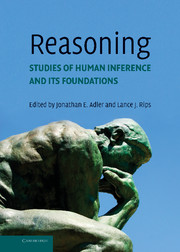Introduction: Philosophical Foundations
Published online by Cambridge University Press: 05 June 2012
Summary
Reasoned transitions
Reasoning is a transition in thought, where some beliefs (or thoughts) provide the ground or reason for coming to another. From Jim's beliefs that
(1) Either Bill receives an A or a B on the final.
and
(2) Bill does not receive an A.
he infers that
(3) Bill receives a B.
Assuming that Jim bases his inference on the deductive relation of (1) and (2) to (3), his conclusion is warranted, since the argument is valid. (1) and (2) implies (3), since it is not possible, as contradictory, for (1) and (2) to be true and (3) false. More formally, φ is a logical consequence of Γ if and only if there is no interpretation (model) in which all sentences of Γ are true but φ is false (Tarski 1983).
Although in reaching (3) Jim comes to a new belief, its information is already entailed by (1) and (2). Unlike deduction, an inductively good argument provides for new beliefs whose information is not already entailed by the beliefs from which it is inferred:
(4) Bill brought his back pack to class every day of the semester.
So, [probably] (5) Bill will bring it to the next class.
The falsity of the conclusion (5) is compatible with the truth of the premises (4). The premises only render the truth of the conclusion more probable (than in their absence). Although this is a good inductive argument, the premises can be true and the conclusion false, so the argument is invalid.
- Type
- Chapter
- Information
- ReasoningStudies of Human Inference and its Foundations, pp. 1 - 34Publisher: Cambridge University PressPrint publication year: 2008
References
- 3
- Cited by



